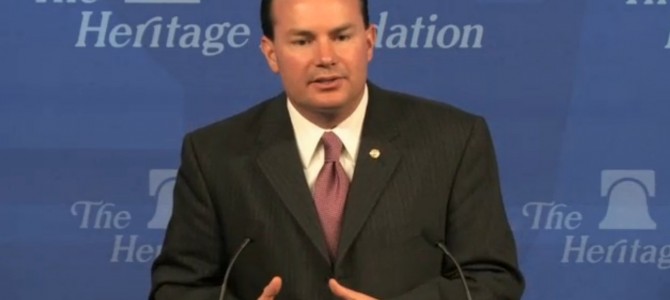
As Senator Mike Lee strode to the podium last week, intra-conservative quarrelling had reached a fever pitch. A lengthy editorial by two prominent Beltway Burkeans vocally denounced Republicans for perpetuating “intra-Republican denunciation.” The Cruz camp punched back with characteristic bluster: Leading populist Erick Erickson savaged the mere “stenographers of the party” who dared push pragmatism.
Both factions could plausibly have expected Lee’s Heritage speech to bolster their case. On one hand, Utah’s junior Senator had just finished sounding the charge on defunding Obamacare, cementing his status as a Tea Party superstar. But Lee has also endeared himself to center-right reformers, thanks to a promising new tax proposal and an eloquent presentation on pro-community conservatism.
One way or the other, Lee’s remarks were bound to disappoint someone.
Yet they didn’t.
The brightest reformers came came away smiling, and top populists also seemed satisfied. This is no small feat, and conservatives need to pay close attention to how he pulled it off.
Lee began his remarks with a much-needed reminder: In politics, practice is primary.
When pundits and politicos are relegated to opposition status, it grows easy to mistake abstract debates—however enlightening or entertaining—for constructive coalition-building. Conservative observers have become something like the enthusiastic sophomore philosophy major who insists that we all ought to reason out coherent, top-to-bottom moral philosophies before getting out of bed in the morning. They forget that most often, thoughtful rationalization follows from lived experiences, not the other way around.
I love to play with ideological jigsaw pieces as much as the next guy. But the simple fact is that unity flows from imaginative policy proposals and genuinely talented candidates, not from one more Twitter spat or meticulous long-read.
Reagan’s famous joke that “an economist is someone who sees something that works in practice and wonders if it would work in theory” could have been aimed at us. Clinton’s Third Way and Reagan’s New Right became dominant because those candidates had the best concrete ideas and the most electoral athleticism, not because commentators and intellectuals unanimously agreed to those doctrines ex ante and then went shopping for men to represent them.
In other words, the answer for our grand ideological stalemate is in no small part to simply stop harping on it. This is exactly the point Lee made. Recalling fondly how conservatives spent the late 1970s shedding their policy chops and doing ground-level intellectual grunt work, he urged conservatives to shift their attention towards translating the general thrust of our shared principles into a modern, actionable agenda, rather than bickering endlessly about precisely what those “stone tablets” actually say.
What appears to be an intractable intellectual divide between camps of modern conservatives, he posited, is no larger than “the size and shape of a new, unifying conservative reform agenda.”
And the agenda Lee went on to detail begins to prove his point. Consider these specifics:
- Repeal Obamacare;
- Create a new $2,500 per-child tax credit, refundable against both income and payroll liabilities;
- Remove federal barriers to flex-time for hourly employees;
- Scale down the federal gasoline tax and devolve transportation authority to states and localities;
- Let states ask the Department of Education to accredit experimental forms of a la carte education (online courses, apprenticeships, etc.)
Each of these changes can be read as applying libertarian populist means in pursuit of Burkean communitarian ends.
After all, repealing the ACA, cutting taxes, liberalizing labor markets, and deregulating education are at first blush negative reforms. They clear away underbrush; they remove active government barriers to growth and innovation rather than trying to chart its course and prod it along. In line with libertarians’ best insights on how bottom-up innovation is bred, they aim to throw open doorways to diffuse, messy, frictional marketplaces for insurance and schooling and transit rather than trying to reason out a priori what is best for states and citizens and impose that monolithic vision from on high.
So far, so good for the burn-it-down crowd.
But once the red tape has been cut and the creakiest sections of ossified government scaffolding have come crashing down, what next steps does Lee envision?
On transit:
More roads, bridges, lanes, and mass-transit…innovative green technologies…congestion pricing and smart tolls…diverse localism and innovative environmental protection.
On education:
[A]ccreditation would be available to specialized programs, individual courses, apprenticeships, professional credentialing, and even competency-based tests…States could use innovative systems to attract new opportunities and businesses, investing in their own future by investing in the human capital of their citizens.
And the same optimistic vision of collective action—of state and federal practices that can, if aimed appropriately and cabined carefully, do more than foul things up—pervades the rest of Lee’s proposals.
Lee paints a picture that leaves real room for cooperation through government, yet it’s unthinkable that any serious populists would condemn him as a wannabe social engineer whose hands itch for the levers of benevolent paternalism. He proposes incremental steps that any libertarian could love without sounding too negative, appearing too nihilistic, or fixating too narrowly on individual autonomy—quagmires from which the center-right crowd is completely right to recoil.
And in doing all this, he illustrates the best way to bridge these seemingly enormous internecine divisions. The answer isn’t doubling down on overheated generalities. It’s simply bringing the discussion back down to Earth.
There is more to unpack in Lee’s remarks, and nothing is to say that this Senator’s specific laundry list must become GOP gospel. His own remarks admitted as much; he called not for unanimity but for “another Great Debate.”
But Lee’s broader message must be heeded. A political movement that typically disdains top-down, one-size-fits-all fixes in favor of bottom-up dynamism should apply the same standard to our own navel-gazing. It’s time for conservatives to stop searching for our salvation in the stratosphere, and begin assembling it ourselves with concrete suggestions and practical policies.
Andrew C. Quinn studies public policy and human happiness at the American Enterprise Institute.








